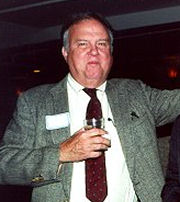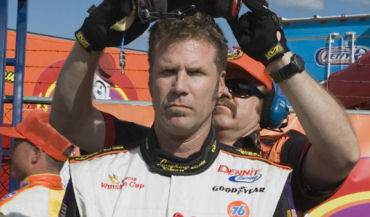Cool-cat screenwriter Larry Karaszewski (1408, Man on the Moon, Ed Wood) has written in response to that Nic Cage-as Liberace item I wrote that dissed Liberace project screenwriters Aaron Seltzer and Jason Friedberg, the gag-men who wrote large portions of the Scary Movie and Date Movie and Spy Hard screenplays. Karaszewski, who oversaw the development of the Liberace script with partner Scott Alexander, says “it’s actually very good.” I believe Larry because I respect his work, but I’m having trouble digesting this. How can Friedberg and Seltzer write crap like Scary Movie and
Month: July 2006
Bitter Tea
Bitter Tea
I missed David Poland’s 7.24 summary of an old media vs. new media dustup that largely occured the day before, but better late than never. The highlight was a short but stinging criticism of Time magazine critic and documentarian Richard Schickel by Hollywood Reporter columnist and RiskyBiz blogger Anne Thompson for a recent and obviously resentful Schickel diss of online film critics and columnists.
Poland’s account opens with a 7.23 Cathy Siepp guest editorial in the L.A. Times that laments a persistent tendency of old-media Times staffers to diss online writers and reporters in a clueless and petty way. (Poland has been one of the dissees in a David Shaw piece that ran in the Times five years ago.)


Time film critic, author and documentarian Richard Schickel; Hollywood Reporter columnist Anne Thompson
Then it shifts over to the brief Schickel-Thompson contretemps, which was over a remark in a Schickel-penned book review that ran in the 7.23 L.A. Times. Schic- kel began his piece with a diss of online film columnists by saying that the current film-writing “pendulum seems to be permanently stuck at the burbling end of the spectrum, where the bloggers — history-free and sensibility-deprived — weekly blurb the latest Hollywood effulgence and are rewarded by seeing their opinions bannered atop movie display ads in type sizes elsewhere reserved for the outbreak of wars and the demise of presidents.”
This brought a response from Thompson titled “Is Time‘s Richard Schickel out of date?”, and it said the following: “Is Schickel feeling the pressure of younger critics nipping at his heels? Enough. If you’re too outmoded to understand today’s movie aesthetic — or the existence of many blogs that feature excellent film criticism, along with the ones that don’t — stop writing about them. Schickel is a terrific book writer, documentary filmmaker and voiceover artist. There are plenty of worthwhile activities to keep him busy.”
< ?php include ('/home/hollyw9/public_html/wired'); ?>
Do most online film columnists exude the aesthetic sensibility and historical perspective of, say, Schickel or Charles Taylor or David Edelstein? Some don’t. But there are just as many (if not more) insufficiently cultivated writers in the print world as in the cyber, and what certain online pundits may lack here and there in terms of cultured perspective and/or sophistication is more than compensated for with their passion and to-die-for particularity.
It’s widely recognized, I think, that online film writers convey far more in the way of personality and hot-blood conviction than old-media types, who, I sense, are often constrained by their editors’ insistence upon conveying a tone of measured semi- dispassionate journo-speak. Obviously not always — I ‘ve always loved the honed precision of Schickel’s Time reviews along with those by print guys Joe Morgen- stern, David Ansen and Peter Rainer (among dozens of others) but I sometimes wonder what these guys really, really think deep down, and how they’d phrase it if they’d let their hair down a bit.

But of course, Schickel’s ire is mainly about the attention the online pundits are getting by way of quotes in print ads. My God…this is one of the brightest, most learned and most sophisticated film critics in the world, and with these words Schickel has put on the cloak of a grumpy old coot swatting at pesky young whippersnappers nipping at his professional heels. He and some of his brethren obviously feel threatened by the encroaching presence and power of the online film crowd. As well they should.
Shickel should really try and shake this attitude off. He knows all about the dynamics of change and how young conquistadors have always moved up and eventually displaced the entrenched. Nobody wants to be the older guy who doesn’t get the new sensibility, but it happens to the best of them. It’s an old story. Where’s his perspective?
A similar kind of old order-new order clash between film writers and their editors happened 46 years ago in the case of a young upstart critic named Andrew Sarris. In the summer of 1960 Sarris was lambasted in some Manhattan editorial circles for writing far too seriously and respectfully about Alfred Hitchcock‘s Psycho, which obviously casts Sarris in a perceptive forward-thinker mold by today’s standards.
Three years later N.Y. Times critic Bosley Crowther, easily the biggest frog in the pond back then, ran a rave review of Joseph L. Mankiewicz’s Cleopatra. Try and find anyone today who feels Cleopatra is even a half-good film. (I think the opening 20 minutes with Rex Harrison are pretty good, but then Elizabeth Taylor rolls out of that Persian carpet and it all goes to shit.)

Later that year Crowther expressed dismay at the impudence of Dr. Strangelove, and particularly its lack of respect for the U.S. military. Four years later Crowther viciously panned Bonnie and Clyde, and that was it. He was over. The culture had passed him by.
Crowther’s fuddy-duddyisms and Schickel’s disdain of new-media film writers obviously aren’t analagous in every respect, but the older-guy analytical tendencies are, I feel, at least somewhat similar. Older entrenched writers don’t tend to get new stuff as completely as younger, not-as-corporately-connected writers, and some of them tend to bash avatars of the new for being crude or pandering or not worldly enough. But worlds change.
“Good” trailer
A nice, intelligent, very confident trailer for Ridley Scott‘s A Good Year (20th Century Fox, 11.10). It’s obviously going to be an agreeable, intelligent, wake-up-and-smell-the-coffee movie about cherishing the things in life that are rich and fine and good for your soul. And it has another quite-good Russell Crowe performance to boot, and some wonderful capturings of many delectable south-of-France locations. The downside is that the story (i.e., the portion provided by the trailer) seems a tad predictable. But it’s all in the telling, right? The singer, not the song.
Sandler = Dylan
Since running the Reign O’er Me piece last night and particuarly that top photo of Don Cheadle and Adam Sandler in a vinyl record store, a lot of guys have written in about Sandler’s resemblance in this photo to Bob Dylan during his Blonde on Blonde period. The more general response is simply that the Dylan coif looks cool.

One guy wrote, “Wow, I can’t believe how much better Sandler looks with long hair. Why does he always crop his hair so short that his head looks like an egg with a nose?” (I myself liked Sandler’s shaggy Wedding Singer look way back when, and was kind of dismayed when he shifted over to shorter hair after that.) The obvious thing to take from all this is that Sandler — hello? — would make a great Dylan in Todd Hayne‘s I’m Not There. Which I don’t think is fully cast yet.
Superman Brando CG-face
This Superman Returns promo, which was produced and for all I know viewable last month, is one of the smartest and most visually fascinating demonstrations of how first-rate CGI can reconstitute flesh and blood (i.e., in this case Marlon Brando‘s face). Reader’s Note: HE spotted the link to this demo video on David Poland‘s Movie City News site, which means of course that Poland owns it — he linked to it first, so he has online territorial link rights for the remainder of the 21st Century. HE sincerely apologizes to MCN for trespassing on Poland’s private turf. Wait a minute…AICN had it on 6.19? Never mind.
Murray likes “Talledega”
“I shared all your fears about Talladega Nights — not despite but because I’m a Southerner. I never, ever got NASCAR. And I dreaded, dreaded seeing the movie. Yes, it will get an audience automatically because of the combo of Ferrell and the whole insane NASCAR phenomenon, and don’t even get me started on the idea that watching guys drive fast around a paved oval is so much more important to a huge number of people than voting or following the news is to them. But I gotta tell you, I laughed out loud at this movie , and I almost never laugh out loud. There’s an inspired, almost surreal wit to it at times, and the cast is surprisingly strong. Take that for what it’s worth. It’s a great big goof of a film, but sometimes that laugh-out-loud response is all you want. I was surprised, that’s all. Even though I think NASCAR and all it represents is… well, never mind.” — Steve Murray, film critic, Atlanta Journal-Constitution.
Cage Does Liberace
Nic Cage playing Liberace is a great, great idea. I’m there. Cage will get Liberace’s voice and posture and clothes just right. And he’s producing it also, so he’ll get to dictate stuff on all the levels. But there’s a problem –a big one — and it’s the fact that Aaron Seltzer and Jason Friedberg, the gag-men who wrote large portions of the Scary Movie and Date Movie and Spy Hard screenplays, have written the Liberace thing.
If I were Cage, I would boot these bozos off the project right now and find real screenwriters…seriously. TMZ’s Claude Brodesser has written that Seltzer and Friedberg’s “look at Liberace’s life is understood to be far more serious.” Hold it, Claude…movies are not serous or un-serious. They’re either good or un-good or cheesy or un-cheesy, and anyone who’s seen Date Movies and Spy Hard knows where these gusy are at. Spare us of the notion that Seltzer and Friedberg are suddenly going to channel Robert Bolt or Scott Frank or David Ayer or Cameron Crowe and become different writers.
DePalma’s “Dahlia”
Brian DePalma‘s The Black Dahlia debuting at the Venice Film Festival….great. I truly don’t believe anything good can come of this film except a spike in James Ellroy‘s book sales. The ’40s noir thing is over…done to death. DePalma — a truly exciting and out-there director from the late ’60s to early ’80s, and an occasionally successful commerical director from the mid ’80s to mid ’90s, has been over in the sense of failing to read or respond to the culture for years. I used to love the guy but then he made Femme Fatale and that was it. Two likely solves to the real Black Dahlia murder have been published — take your pick but they both sound pretty good to me. Alas, DePalma’s film, based on Ellroy’s “The Black Dahlia”, is fictional. DePalma’s chops are always first-rate — the guy has always been an audacious pro — so it might make for a good sit but I keep getting these vibrations and radio signals telling me it won’t be.
Ritchie Trying Again
Guy Ritchie is a once-hot director (Lock, Stock and Two Smoking Barrels) who baked his career and turned himself into an international joke when his remake of Wertmuller’s Swept Away tanked, in large part because he made it with Madonna, his wife. And then he made things worse with a film called Revolver which nobody liked when it showed at Sundance last January. Now he’s having another go, although he’s occupying a lower postiion on the totem pole.
According to the Guardian, Richie is the third helmer to try and get a crime flick rolling called Static. It’s about a wrongly-convicted mob guy being forced to testifying against some dirty cops. Ritchie will reportedly rewrite and direct the script, which was first written by New Zealand director Brad McGann five years ago.
The point is that back in the late ’90s Ritchie would have been the guy to make this film, but the Static producers came to him only after first trying to make it work with Stephen Kay and then music-video maestro Chris Robinson. Guardian critic Peter Bradshaw reportedly wrote earlier this year that “after Revolver, Swept Away now looks like Citizen Kane“.
Talledega Boffo
The hottest picture on the tracking list right now is Will Ferrell‘s Talledega Nights: The Ballad of Ricky Bobby (Columbia, 8.4), which you and I know is going to be a dumb-ass redneck comedy pretending to be a satire of dumb-assed redneck car culture. We also know that fast-car movies are basically about old-boy nostalgia and the days when you could peel out and wail without worryin’ about nothin’, man. But times have changed, Jethro…sorry.

This is going to make me sound like a humorless liberal, but as funny as it may turn out to be (and I realize Ferrell and Adam McKay are going to mock red-staters and their values with this film) Talledega Nights will also be serving as a kind of yeehaw comfort-zone movie in spite of itself. A comfort zone for everyone who’s in denial about global warming and who refuses to see An Inconvenient Truth…a movie for all the ecological neanderthals to rally around and relax and rib each other about.
Friggin’ Ferrell, man…funny guy…vroom! vroom!…fill the friggin’ atmosphere with greenhouse gases….pass me another tasty groundup-pig-intestine hot dog…slurp down another frosty…yeahhhh!
Talledega has a 39 % definite interest and that’s from a phone survey of largely urban movieogers. I’m saying that the surveyors aren’t talking to people in the backwater shitkicker regions, which is where a lot of the business for this film is going to come from, so it’s going to be even bigger. I’ve been told (and I would naturally assume) that a lot of the Talledega ad money is being spent on this demo. As anyone would..c’mon. The ad people aren’t stupid.
Otherwise there’s a good amount of interest in World Trade Center (Paramount, 8.9) but there are stumbling blocks — Nic Cage isn’t a star, the 9/11 backdrop is a mixed bag with general audiences, and Oliver Stone doesn’t sell tickets like he used to between the late ’80s and the mid ’90s.
Miami Vice is going to do what it’s going to do, but I’m getting the idea that it’ll be a push to make $20 million this weekend. I hope I’m wrong, but the phrases I’m hearing are “soft landing” and “pissing upstream.”
Boiled pot
Notice how the cheap metal pot sitting on my non-Martha Stewart stove in my kitchen is not perfectly round? How it’s all warped and oddly bent and has a darkly-stained bottom? That’s because every day I boil water for tea and then I go back to the computer to write something, and then I come out of my writing coma 15 or 20 minutes later and the water is all boiled out and the pot is just taking the heat.

So I pick it up with a pot holder and pour cold water on it and the kitchen fills with steam. I have done this, no exaggeration, about 40 or 50 times now, which is why this pot is totally baked and about to be tossed. I’ve already ruined two Bed, Bath and Beyond pouring pots this way…nice ones too. The kind that whistle when the water’s ready, I mean. And even when they were whistling I used to ignore them so I could finish the thing I was writing at the time. So it’s not cool and pretty stupid, really. And I’m just admitting this, M.Night Shyamalan-style.
Yari stiffing “Crash”-ers?
So Crash producer Bob Yari isn’t paying out all the money he should be paying to the profit participants on Crash — director-cowriter Paul Haggis, screenwriter Bobby Moresco, Sandra Bullock, Matt Dillon, Don Cheadle and five other actors in the cast — and the meager money he’s parted with has been slow in arriving. This despite Crash having cost only $7.5 million to shoot and the total world income standing at $180 million so far. Why? Hollywood bookkeeping, people skimming, human nature.
A seasoned publicist who’s been at this racket since the ’60s once told me that people you work with will almost always fuck you financially one way or the other — by shortchanging you, by delaying payments, by disputing what you’re owed. Every damn time, he said. It’s probably built into our genes, he said.
Yari tells N.Y. Times reporter Sharon Waxman that he’s “aware of the dissatisfaction, but that [he’s] completely up to date on payments. The profit participants “have been correctly paid,” he told her. “They will be paid more. This is the process. We’ve done everything aboveboard. If we wanted to not pay people and have them sue us, we wouldn’t pay them at all.”
I don’t know about that. I think that if Yari wanted to stiff the Crash participants without getting into a bunch of lawsuits he would (a) delay, and then (b) delay some more, and then (c) he’d finally send two or thee of them a modest check for $19,000, and then (d) he’d piss around some more, and (e) then say that Lion’s Gate and other people on hoarding profits, not him, and then (f) if a reporter called he’d get on the phone and say that everything is in perfect order.

